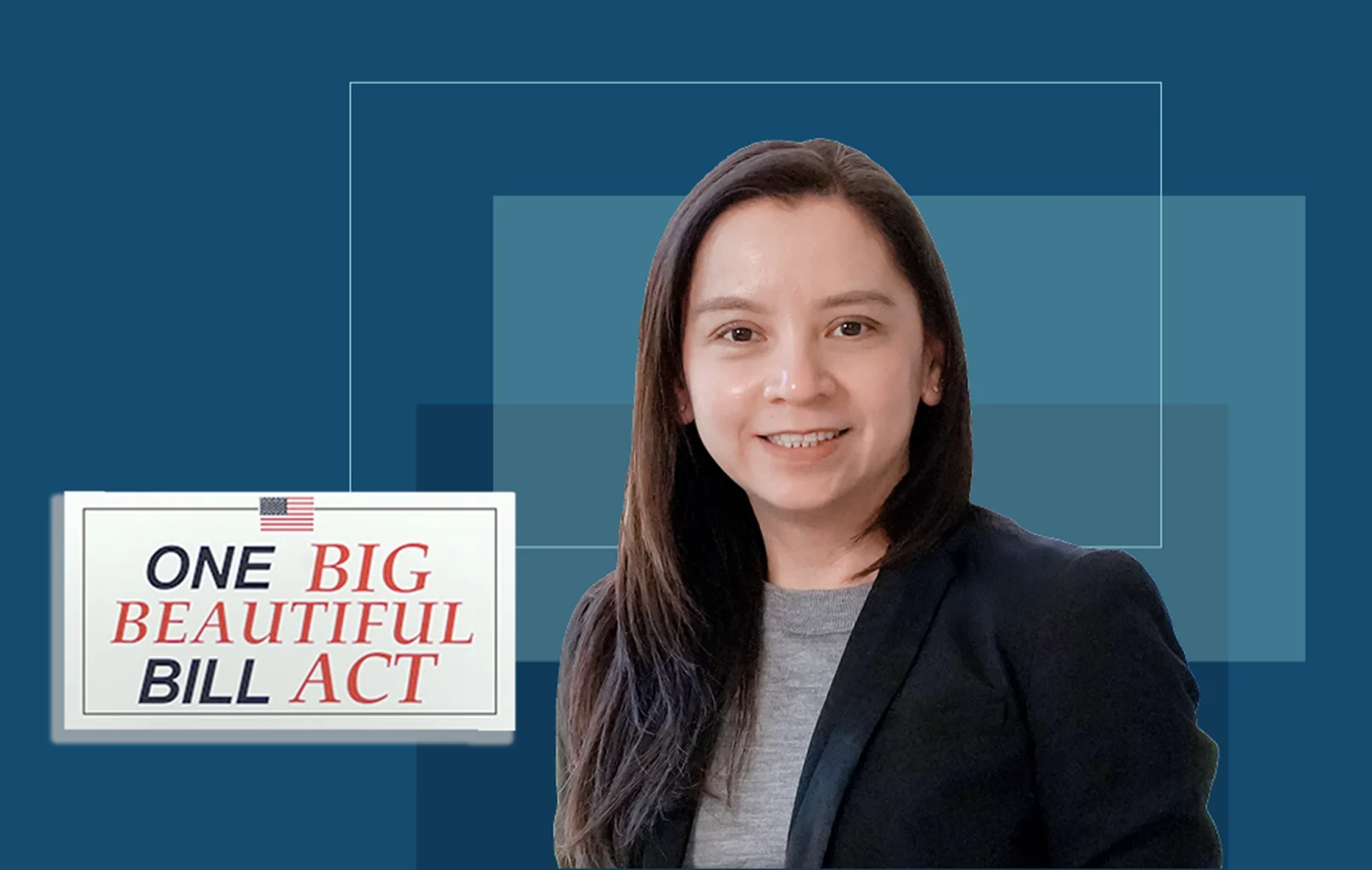
By Ejie De Jesus,
Partner – Tax Strategy and Advisory

The One Big Beautiful Bill Act (OBBBA) introduces sweeping tax changes that will significantly impact businesses, individuals, estates, and clean energy investors. From new expensing rules to adjusted estate thresholds and the sunset of several clean energy incentives, the law signals a major shift in tax planning strategy. Many provisions begin taking effect over the next two years, and some may apply to prior-year returns, making it critical to understand both the effective dates and how the changes interact.
Corporate Tax Changes
The OBBBA does not change the current 21% corporate income tax rate. Instead, it makes several business tax provisions permanent, including the 100% bonus depreciation for qualified assets and the immediate expensing of domestic research and experimental costs. The law also modifies international tax rules, such as increasing the Base Erosion and Anti-Abuse Tax (BEAT) and revising the Global Intangible Low-Taxed Income (GILTI) rules. The Qualified Business Income (QBI) deduction under Section 199A is made permanent, with new provisions to expand phase‑in ranges for (specified service businesses) SSTBs and other businesses subject to wage-and-property limitations.
Individual Tax Changes
The legislation makes the individual income tax rates from the TCJA permanent, extending the current seven tax brackets effective January 1, 2025. The long-term capital gains rates remain unchanged. The standard deduction is set at $15,750 for single filers and $31,500 for joint filers starting 2025, indexed annually for inflation. Additionally, seniors age 65 and older will receive a $6,000 deduction through 2028. This additional deduction phases out for incomes over $75,000 (single) or $150,000 (joint), and ends completely at $175,000 and $250,000, respectively. The Child Tax Credit will increase to $2,200 per child in 2025, with $1,700 of that amount refundable. The qualified small business stock (QSBS) rules under IRC Section 1202 were enhanced for QSBS issued after the act’s enactment date, July 4, 2025, changing the exclusion percentage to a tiered structure that ranges from 50% for QSBS held after three years to 100% for QSBS held after five years.
Estate and Gift
Tax Changes
Estate and gift tax provisions expand the federal exemption to $15 million per individual (or $30 million per couple), effective January 1, 2026. This amount will be indexed annually for inflation, eliminating the previously scheduled reversion to a lower exemption level. The change provides a long-term planning opportunity for individuals and families to manage estate transfers with greater flexibility.
SALT Deduction Cap Changes
The SALT deduction cap will increase to $40,000 for joint filers and $20,000 for separate filers beginning in 2025 and running through 2029, before reverting to the $10,000 limit beginning in 2030. This expanded deduction is subject to a phaseout for taxpayers with modified adjusted gross income (MAGI) above $500,000, reducing the benefit for higher earners.
Clean Energy Incentives
The Act accelerates the sunsetting of certain clean energy incentives. It terminates the residential clean energy credit and the energy efficient home improvement credit for property placed in service after December 31, 2025. The federal tax credit for electric vehicles is also set to be phased out. Taxpayers hoping to qualify before these incentives expire should act in a timely manner.
Other Notable Provisions
A new, temporary provision – the “No Tax on Tips” deduction – allows individuals to deduct up to $25,000 in tipped income from 2025 through 2028. This benefit phases out for single filers with MAGI over $150,000. The Alternative Minimum Tax (AMT) is modified to raise exemption amounts and phaseout thresholds starting in 2025. The mortgage interest deduction for principal amounts up to $750,000 is made permanent. Additionally, a new deduction for overtime pay provides tax relief to workers earning above-standard hours, effective starting in 2025.
The OBBBA brings heightened scrutiny to high-income individuals and large corporations. While the corporate tax rate remains unchanged, permanent individual rates and reduced deductions for higher earners could impact filing positions and audit exposure. Small business owners and pass-through entities should reassess their income thresholds and eligibility. For clean energy investors, the accelerated sunsetting of key incentives and stricter eligibility rules create a narrowing window to act. Uncertainty remains around IRS implementation of certain provisions, especially for SALT and clean energy measures, so staying informed will be crucial.
At The Sights Group, we help businesses and individuals navigate tax policy changes with clarity and confidence. Our team of tax professionals can help you evaluate how the OBBBA affects your specific tax profile – whether you’re a business owner, executive, investor, or individual taxpayer. From impact assessments to proactive planning, we’re here to help you make informed decisions around the OBBBA.
Let’s start a conversation about what comes next for you.
Schedule a consultation to learn how we can support your growth-stage business.